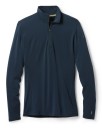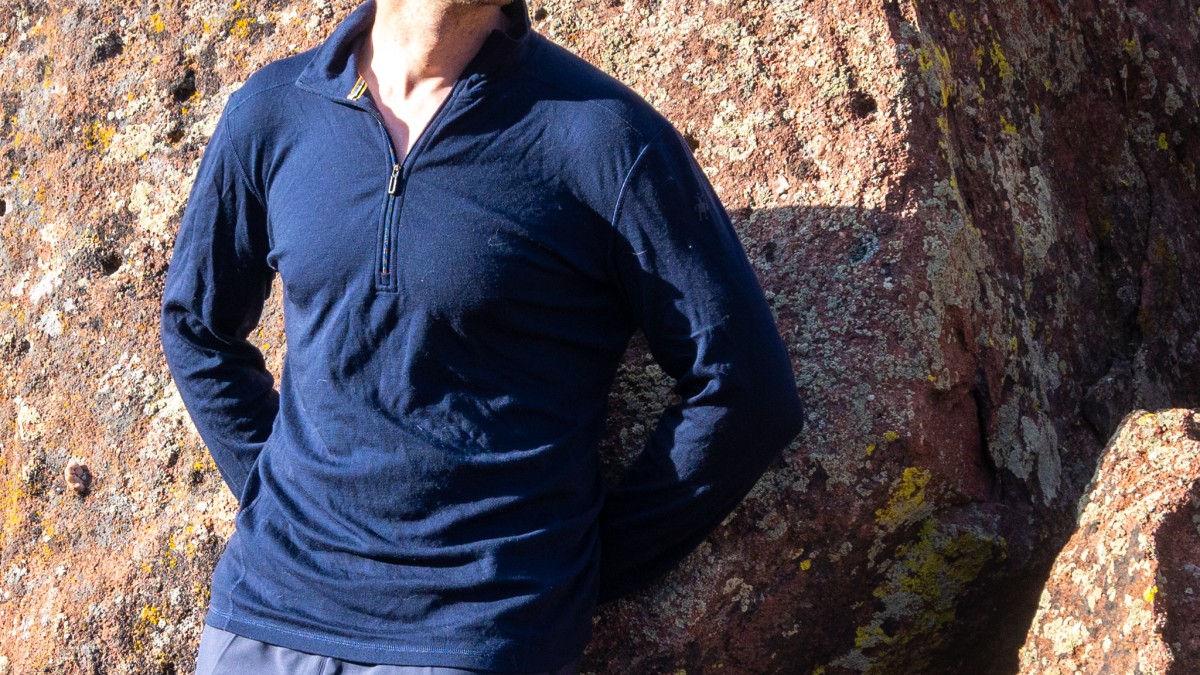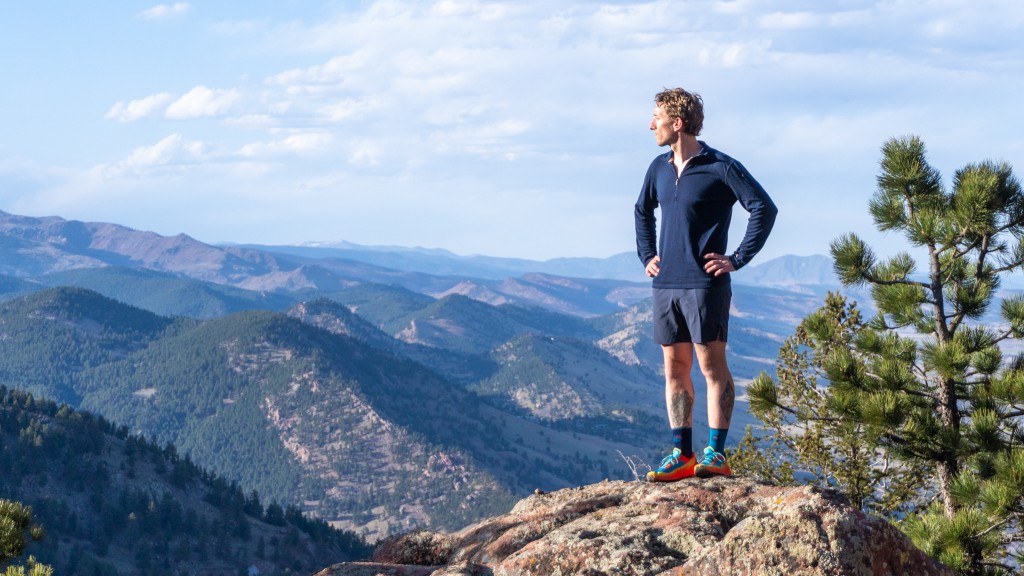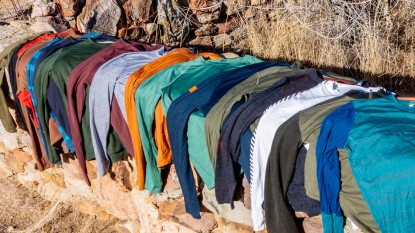Our Verdict
Compare to Similar Products
 This Product
Smartwool Classic Thermal Merino 1/4 Zip | |||||
|---|---|---|---|---|---|
| Awards | Best Overall Base Layer | Most Versatile Base Layer | Best Synthetic Bang for Your Buck | Best Midweight Layer | Best Value for Merino |
| Price | $105.00 at Backcountry Compare at 4 sellers | $145.00 at Amazon Compare at 2 sellers | $60 List $59.95 at REI | $96.73 at REI Compare at 3 sellers | $60 List $59.99 at Amazon |
Overall Score  |
|||||
| Star Rating | |||||
| Bottom Line | If ultimate warmth over everything else is what you seek in a base layer, look no further | Other than the coldest of conditions, this base layer excels at almost any environment | Reach for this base layer when the temperature drops to wear underneath your jacket | This base layer is made for those who spend time in the cold and need to keep warm, comfortable, and dry | A fine Merino base layer at an entry-level pricepoint |
| Rating Categories | Smartwool Classic T... | Black Diamond Solut... | REI Co-op Midweight... | Smartwool Intraknit... | Meriwool Merino 250... |
| Warmth (25%) | |||||
| Breathability (20%) | |||||
| Comfort and Fit (20%) | |||||
| Durability (15%) | |||||
| Drying Speed (10%) | |||||
| Layering Ability (10%) | |||||
| Specs | Smartwool Classic T... | Black Diamond Solut... | REI Co-op Midweight... | Smartwool Intraknit... | Meriwool Merino 250... |
| Measured Weight (Size Large) | 11.3 oz | 8.0 oz | 10.0 oz | 8.0 oz | 8.6 oz |
| Measured Shirt Length (Size Large) | 28 in | 29 in | 29 in | 29 in | 30 in |
| Material | 100% Merino wool | Nuyarn: 78% Merino wool, 22% polyester | 92% recycled polyester / 8% spandex | 53% Merino wool, 45% polyester, 2% elastane | RWS Merino wool |
| Fabric Weight Class | Midweight | Lightweight | Midweight | Midweight | Midweight |
| Fit | Semi-fitted | Slim fit | Semi-fitted | Slim fit | Slim fit |
| Thumb Loops | No | Yes | Yes | No | No |
| Air Dry Test | 70 min | 45 min | 55 min | 45 min | 65 min |
| Dryer Safe | Yes | No | Yes, tumble dry low | No | Not stated |
| Odor Control Fabric | Naturally odor resistant | Naturally odor resistant | None | Naturally odor resistant | Naturally odor resistant |
| UPF Sun Protection | None listed | None listed | 50 | None listed | 50+ |
| Seam Stitching | Flatlock seams | Flatlock seams | Flatlock seams | Flatlock seams (mesh inserts are seamless 3D) | Flatlock seams |
| Shoulder Top Seams | No | No | No | Yes | Yes |
| Drop Tail Hem | No | No | No | Yes | No |
| Available Cuts | Crew, 1/4 zip, hoodie | Crew, 1/2 zip hoody | Crew, 1/2 zip | Crew, 1/4 zip | Crew, 1/2 zip |
Our Analysis and Test Results
The quality, 100% Merino wool used in the Classic Thermal 1/4 Zip comes with some amazing qualities that we love seeing in a base layer. The warmth of wool is well known, and the 250 g/m² weight of this top makes it one the warmest we've tested. Wool also comes with unique breathability characteristics, naturally wicking away perspiration from the surface of your skin, helping to keep you comfortable rather than soggy. The Merino wool used in the Classic is soft and lofty, and we didn't notice any of the scratchiness you may experience with a lower-quality piece. The semi-fitted cut leaves a lot of wiggle room for various body types and also allows you to pair this top with another leaner and stretchy base layer when you're looking for even more flexibility in your layering system. Can we say anything negative about this layer? Wool is just a more delicate material than synthetics, so treat it well both when wearing and caring for it to protect your investment and keep it around for many years of adventures.
Performance Comparison
Warmth
Toasty! The Classic Thermal 1/4 Zip scores high in our tests for warmth, thanks to its medium weight, 250 g/m² 100% Merino wool fabric. This is the heaviest weight that Smartwool uses for base layers and the heaviest weight for all base layers we test ourselves. Anything heavier and the top works less as a base layer where you want freedom of movement to be tantamount. The Classic Thermal Merino excels in cold, wintry conditions.
Several features of this base layer enhance its warmth. The high collar rests just above the chin when the shirt is fully zipped up, keeping drafts from sneaking up from the top. The sleeves are extra long to completely cover up your arms, no matter your ape index. And the front ¼ zipper itself facilitates thermoregulating when you need to bundle up for extra warmth or unzip to dump excess heat.
Breathability
For such a thick and warm base layer, the Classic Thermal fared well in our breathability tests. Being warm is one thing, but you don't want to be soaking in your own sweat underneath your mid and outer layers. The renowned natural moisture-wicking qualities of Merino wool are one of the reasons why most of the thermal base layers we test and review utilize it. Wool, being naturally hydrophobic, transports sweat from the skin surface towards the surface of the base layer, keeping you drier. This magical dance of wool to keep you dry and warm is seen most in thicker wool base layers.
In the real world, we tested this layer on all-day bike rides, cold camping nestled in our sleeping bags, vigorous hikes to summit the mountains in the backcountry, and haunting the local coffee shop. We're more than pleased, but our time in this base layer cemented our belief that this is a great top for cold-weather conditions in particular; you'll just get too hot if the sun starts shining brightly enough to melt the snow around you.
Comfort and Fit
We found the Classic Thermal has a looser fit than many of the athletic, skin-hugging Merino wool and wool blend tops we've tested. This may be the way to go for a heavier layer, as tighter tops also need to be a bit stretchy to articulate with the body. The Classic Thermal is 100% Merino wool, so it lacks that super stretch and recoil we've seen in thin Merino blends and synthetics. Although it is designed to be a next-to-skin piece, this looseness also allows it to be worn as a mid-layer, with a lighter-weight base layer underneath. For less extreme conditions, we found ourselves utilizing this configuration often when the afternoon sun made it too warm to want to wear the Classic.
The hand of this fabric is absolutely creamy in its softness, with no feeling of scratchiness at all. This is important, as the collar comes up high on the neck — an oftentimes sensitive area — reaching up to the chin, helping keep drafts from entering from the top.
Careful consideration was made to the placement of the flatlock seams and fabric patterns used in the construction of the Classic Thermal Merino. In particular are the addition of shoulder panels to move the seams off the crest of your shoulders and allow better comfort when shouldering a heavy pack. Our main tester's larger-than-usual shoulders fared well with this top's generous allowance of space as well. The front zip is also padded with an additional wool panel so the potentially freezing-cold zipper never touches your skin. The zipper itself is a great addition to any base layer to help thermoregulate by allowing you to dump excess heat when needed and bundle up afterward. If you don't mind the slight weight penalty a zipper adds, it's a feature to look out for in any base layer you decide to grab.
Durability
As usual, “100% Merino wool” equates to less than bulletproof durability, and the Classic Thermal is no exception. The thicker 250 g/m² of this wool base layer still garnered similar results in our harsh abrasion test as a 150 g/m² Merino wool base layer: holes were ripped right through the fabric. This is just the nature of 100% Merino wool and something to understand when buying anything made of the material. We suggest using this top in its role as a base layer first and foremost, where it's protected underneath more durable mid and outer layers. To extend the life of this base layer, we'd suggest washing it only when necessary. The manufacturer does state that this top can be thrown in the dryer on low, but we prefer to hang it to dry whenever possible.
In the real world, we found the quality of the wool, seams, and zipper to be excellent, with no premature rips, tears, or breakage noticed. The delicateness of the wool is a fair compromise given the performance of wool as a base layer material. If not abused, this worthy investment should last the user a very long and vibrant life underneath flashier accouterments.
Drying Speed
Drying speed can usually be hypothesized to a fairly accurate degree by looking at the type and the thickness of the material. For example: a thicker, 250 g/m² 100% Merino wool base layer like the Classic Thermal should hypothetically dry at a slower rate than both thinner woolies and most all synthetics. This is what our lab tests then confirmed.
Wool is used in base layers as it's an excellent insulator with good warmth and breathability characteristics. As a hygroscopic material, wool actually actively adsorbs water. In other words, it traps water between its fibers rather than absorbing and permeating it throughout the fabric and wetting it out. This can cause slower dry times. Roughly 30% of the wool's weight in water can be trapped before feeling all that wet on your skin.
There have been claims that wool can be warmer than a synthetic when wet and that wool even generates heat when it dries. But these claims are a little exaggerated for us. We will say that the natural wicking qualities of wool help you to at least feel dryer while water and perspiration move from your skin to the exterior of the fabric.
Out of the weeds and back to our real-world tests, we took the Classic Thermal up to the summit of Longs Peak in Colorado during wintry conditions, mostly worn as a mid-layer, where it performed exceptionally to keep us both warm and dry. We also slept in it in our sleeping bags on a five-day backpacking trip and woke up just as dry and comfortable.
Layering Ability
For how soft and thick the 250 g/m² Merino wool fabric is, the Classic Thermal slides smoothly over our skin and most of our mid layers well. The low-profile flatlock seams don't contribute any problems, and only the most scratchy of mid layers would cause issues by hooking into the soft, flocculent wool. Something like our heavy-down sweater with a nylon exterior couldn't have presented less friction against each other.
Since this is one of the heaviest base layers we've tested and it has a looser, semi-fitted profile, we found ourselves using it as a mid-layer on some trips, with a much thinner and tighter base layer underneath. This allowed us to take off the very warm Classic Thermal Merino, and have something else underneath. The high collar makes the front zip easily accessible underneath additional layers, so fishing around to dump some heat was painless. As we mention in other parts of this review, because of the delicate nature of 100% Merino wool fabric, you wouldn't want to use this base layer as a dedicated layer-of-one, like you can with some of the other more durable synthetics out there. Traveling through tough terrain, like off-trail travel through thick brush or exploring slot canyons, will likely cause premature damage to this top.
Should You Buy the Smartwool Classic Thermal Merino?
If you're looking for a warm, soft, comfortable, breathable 100% wool base layer, we think that the Classic Thermal is an absolutely rock-solid choice. It looks good, feels great, and performs even better. Take note of how delicate 100% Merino wool can be, as well as caring for wool when you need to wash and dry it. Cared for correctly, the Classic Thermal Merino should be a righteous partner for your cold-weather adventures for years to come.
What Other Base Layers Should You Consider?
If the cost of the Classic Thermal is beyond your reach, the Meriwool Merino 250 Long Sleeve is a solid option to dip your toes into the world of 250 g/m² 100% Merino wool tops. It does lack a front zip, and the wool isn't as soft or lofty. If you would rather go synthetic, consider the Under Armour ColdGear Base 4.0 Crew, the heaviest and warmest synthetic base layer we've tested. The ColdGear tested much better in two areas: durability and drying speed. But for the weight of the fabric, it's just not as warm or breathable. If you are looking for a high-performance wool top that's not quite as thick, warm, or heavy, move laterally toward the Smartwool Intraknit Thermal Merino. The Intraknit has a more athletic fit, an even loftier wool blend, and slightly better warmth for its weight.















